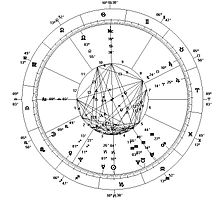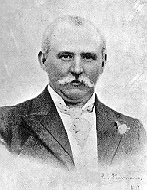User:Pms(nova)/sandbox
Astrology[edit]
Astrology has been present throughout most of our history. Since the 3rd millennium BCE, we have been looking at the stars and seeing what they form. People all over the world look to the stars every night, and some even base their thinking on the formations of stars. Astrology forecasts earthly and human events by observing and interpreting the fixed stars, the Sun, the Moon, and the planets. It is the study of the movements and relative positions of celestial bodies interpreted as having an influence on human affairs and the natural world.
History[edit]

Mesopotamia is where astrology first appeared, and it later reached India. However, the Greek civilization during the Hellenistic era gave astrology its Western shape. Through learning Arabic in the Middle Ages, astrology returned to European culture after entering Islamic civilization as a component of the Greek legacy.[1] Greek mythology holds that the 12 zodiacal constellations divide the heavens and that the bright stars that appear periodically have a spiritual impact on human affairs.
Galileo Galilei and Alan Leo[edit]

Galileo Galilei was an Italian natural philosopher, astronomer, and mathematician who made fundamental contributions to the sciences of motion, astronomy, and strength of materials and to the development of the scientific method. His discoveries with the telescope revolutionized astronomy and paved the way for the acceptance of the Copernican heliocentric system.[2] Alan Leo is considered the father of modern Astrology. Through his publications and tireless efforts, Alan Leo became so widely known that he created renewed interest in astrology, but with a different emphasis than astrologers who came before him.[3]

Why people stargaze[edit]
Looking at the stars helps us keep perspective that whatever we think is so important and overwhelming and difficult in life right now is actually very insignificant. Stargazing eases our minds and rejuvenates our spirits, and research has shown that it makes us more compassionate toward others. Astronomy puts your own life into perspective. "The more I learn about how stars and planets work, the more I am simultaneously delighted in the insights that my God-given talents have let me see, and humbled by the immensity of this beautiful universe that God has given for me to understand."[4]

How formations got their meaning[edit]
The names of most stars are a combination of Latin, Greek, and Arabic words. Many have multiple names or designations. The Almagest was written by the Egyptian astronomer Claudius Ptolemy about 1,900 years ago. The names of stars, as given by various cultures, were documented in this Greek text.[5] This material was translated and used by the Arabic scientific community. In the centuries following the fall of the Roman Empire, the Arab world, renowned for detailed astronomical charting and archiving, emerged as the primary source of astronomical and mathematical knowledge. So, among astronomers, it was their translation that gained popularity. The names we know today are phonetic translations of their Arabic terms into English.[6]
Astrology Day[edit]
Astrology Day takes place on any day from March 19 to March 22. It mostly falls on March 20 and 21 and takes place on March 21. The specific day is dependent on the day that the Northward equinox occurs.[7] The holiday is observed by astrologers and people that are enthusiastic about astrology. The first World Astrology Day was observed in 1993 by the members of the Association for Astrological Networking (AFAN). The occasion is seen by astrologers as the beginning of the astrological year. The first full day of the astrological sign of Aries marks the beginning of the tropical zodiac.[8]
References[edit]
- ^ "Development of astrology from ancient to modern times | Britannica". www.britannica.com. Retrieved 2022-11-21.
- ^ "Galileo | Biography, Discoveries, Inventions, & Facts | Britannica". www.britannica.com. Retrieved 2022-11-21.
- ^ "Alan Leo, horoscope for birth date 7 August 1860, born in Westminster, with Astrodatabank biography - Astro-Databank". www.astro.com. Retrieved 2022-11-21.
- ^ "Why We Stargaze". Denver Catholic. 2020-06-18. Retrieved 2022-11-21.
- ^ "How Did Stars Get Their Names?". ThoughtCo. Retrieved 2022-11-21.
- ^ "How Did Stars Get Their Names?". ThoughtCo. Retrieved 2022-11-21.
- ^ Mirzaliyeva, Maysara (2022-08-22). "Astrology Day". National Today. Retrieved 2022-11-21.
- ^ Mirzaliyeva, Maysara (2022-08-22). "Astrology Day". National Today. Retrieved 2022-11-21.

